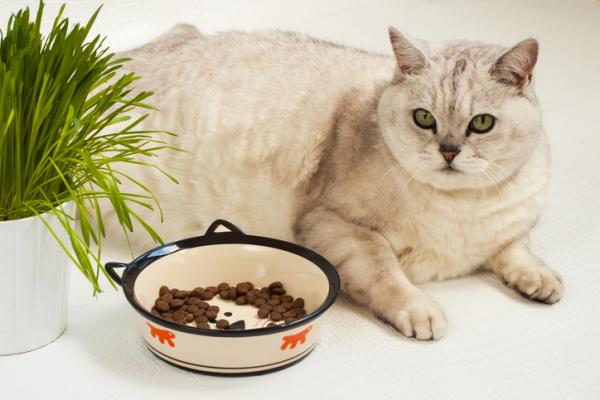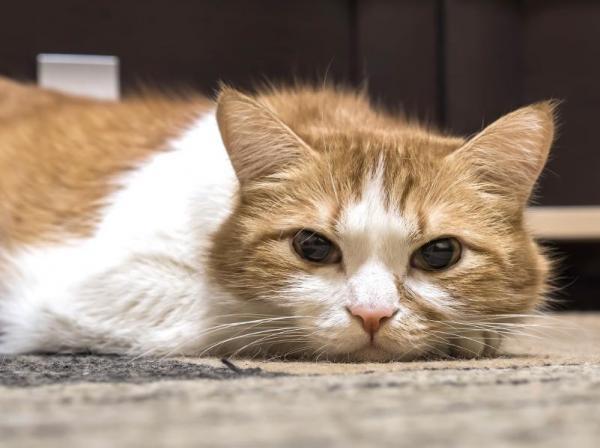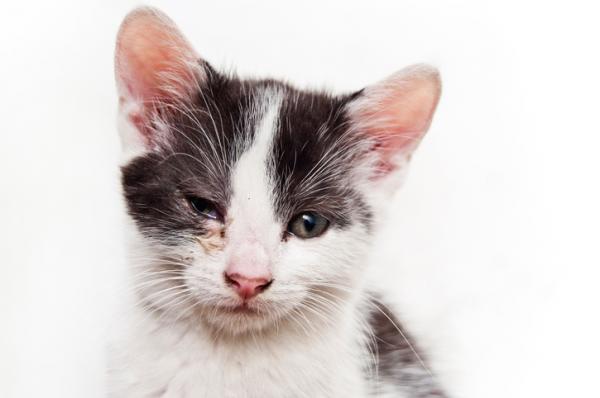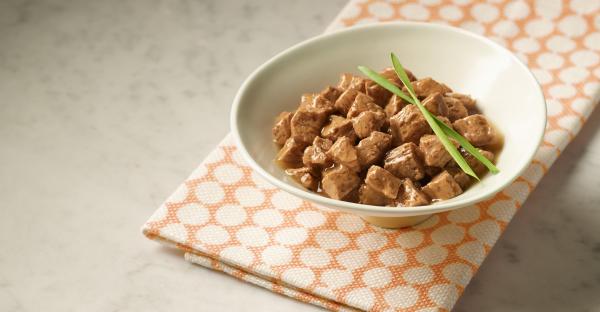Why does not my cat want to eat?

Your cat does not want to eat? Neither do you seem to want to drink water? Sometimes we see that our cats are inapetent and although it may be nothing, sometimes it means that something is not right. The causes that can lead to this change in the behavior of our feline are diverse and we find very simple reasons up to serious complications, which must be treated by the emergency veterinarian.
Some cat breeds will visibly express their needs, as Siamese do, for example. Or else they will “suffer in silence,” as the ragdoll cats do, which barely wail given their shyness. In this article we will explain why your cat does not want to eat and / or drink and what can you do to help him?
Why does not a cat want to eat?
Before starting, it is important to highlight that anorexia in cats is one of the first clinical signs of several diseases. Below we will explain the causes why a cat does not want to eat more usual. Remember that to help you, you must be able to identify what happens to you and what is the reason for this sudden behavior:
- He does not like his food: many cats stop eating before a change of food, therefore, if you have recently modified the diet of your best friend, you should value that he does not want to eat for this reason. Try to stimulate it with tasty food, such as a piece of chicken, ham or wet cat food to know if it is really the cause of the problem.
- The food is too close to the water or the sandbox: Although you do not believe it, it is very important to adapt the home so that your cat feels comfortable in it. It is very common for felines to stop eating if they have near their food the sandbox, water, dirt and even a speck of dust. Some are more delicate than others, but in general, it is a frequent cause of anorexia.
- The heat: it is well known that during the summer the cats usually reduce the intake of food and water. The heat and the fact that they sleep more in the cool areas they discover, make lower your appetite. This reaction is accentuated if we are not aware that our cat has enough water in its drinking fountain to completely quench its thirst. There are cats, more savvy in this aspect, who do not hesitate to climb up to the sink, the bidet, the kitchen tap or the cock of the bathtub to lick them in search of precious drops of water. Therefore it is thirst one of the most common reasons for our cats to stop eating. Discover how to care for a cat in summer so that it is always well hydrated.
- The hairballs: Intestinal hairballs called trichobezoares are the most common causes of our cats suddenly stop eating. These balls whose formation is due to the accidental intake of dead hair from the mantle by the cat when licking itself to preen, are the main reason that reduce the appetite in cats. To avoid said hairballs there are three very easy solutions. The first is a frequent brushing of our cat (especially during the molting period). This action subtracts many possibilities to the formation of trichobezoars. The second solution is to administer cat malt to our feline to avoid the formation of annoying hairballs in your body. Finally, if we have not properly brushed the cat or administered malt, and the balls are lodged in your intestine preventing you from evacuating (which causes an immediate cessation of food intake), the solution will be smear with pharmaceutical paraffin One leg of our cat. The cat will lick the greasy area to eliminate the paraffin, ingesting it when doing it. Paraffin is an artificial fat that neither the stomach nor the intestines of the cat assimilate. Therefore, all the amount that enters, exits, lubricating and dragging out the intestinal trichobezoars to the outside. In the event that this last solution does not work, you should immediately take the cat to the veterinarian to treat it without delay. The life of the cat will be in danger.
- A possible poisoningSometimes, without wishing, we offer you food in badstatus to our cat. It usually happens with fresh feed containers opened for hours and left outside the refrigerator. Or, with leftovers of our food exposed to the summer heat that causes fermentations and insects put their eggs in these rotten foods and can damage the intestinal system of our feline. We must also rule out that the feline may have suffered from poisoning, something that frequently occurs in cats that have access to the outside. Reviewing the symptoms of poisoning in cats is essential. There are also poisonous plants: oleanders, dieffenbachias and many others are toxic plants. The veterinarian should treat the poisoning without delay.
- The Depression: Many people go through this situation. “My cat does not want to eat and is sad“It is one of the most common concerns of the owners. Anxiety and stress caused in our feline by some traumatic circumstance It can also cause our cat not to eat. Change of residence, another new pet, the birth of a baby or death of a family member, may be the cause of cessation of feeding by our sad or jealous cat. Depression in cats is usually the most common reason why the cat stops eating, and even to drink water. We will also observe that he is sad, depressed or depressed.
- Various diseases: if you’re thinking “my cat does not eat and vomits“,”my cat does not eat and is very thin” O well “my cat does not eat and sleeps a lot” Maybe it’s time to consider going to a specialist. A sudden cessation in food intake by our cat, can be a symptom of having a disease. Therefore, if after one or two days the animal does not improve, the visit to the veterinarian is obligatory, since they may be the aforementioned trichobezoars, until severe problems in the digestive system that may require surgery.

What if my puppy cat does not want to eat?
Baby cats or puppies need a special attentionYour immune system is much weaker and you tend to dehydrate more easily if you stop drinking fluids. In addition, they are also usually more sensitive to changes in diet, so it is important to monitor that they eat whenever we change their diet.
Before a puppy cat that does not want to eat, it is always advisable to stimulate it with moist food, even mixing it with warm water to offer an extra hydration. This type of food is much more palatable and has a better acceptance than dry feed.
If a puppy cat has not ingested absolutely anything in 24 hours is a cause for concern and requires a emergency veterinary visit. Also, remember that baby cats need to feed between 4 and 8 times a day, so if in 12 hours a newborn cat has not received food, you should also go to the vet.
Discover more about feeding newborn cats, the stimulation they need to urinate and defecate or the environment in which they should stay.
Symptoms of disease in the cat
In view of this situation, it will also be essential to assess the vital signs of the cat and the symptoms of disease, by means of a general physical examination. Here’s how to do it:
- Check your cat’s mucous membranes (gums, eyes, sex and anus) and if they are of any color other than pale pink it begins to worry you. White, blue, yellow or deep red tones are a symptom of disease.
- Get a digital thermometer to take the temperature of your cat, which is done in the same way as a dog. It should be between 38ºC and 39ºC.
- Take the pulse of your cat with the index and middle fingers, although it should be noted that it can be somewhat complicated. The heart rate should be between the 140 and 200 beats per minute (PPM).
- Check your respiratory rate posing your hand on her belly. Typically, cats breathe between 20 and 42 times per minute (RPM).
Cats do not usually show signs of disease as evident as other animals, so, we leave you some common symptoms of disease:
- Secretions in eyes
- Secretions in the nose
- Diarrhea and vomiting
- Urine with blood
- Bloody stools
- Inability to urinate
- Recurring nausea
- Insistent meows
- Wounds and skin problems
- Presence of parasites
- Foul breath
- Fruity breath
If any of the vital signs of the cat are altered and you also observe symptoms of disease, do not think about it and go to the emergency vet as soon as possible, calling you previously to ensure that they can assist you and receive instructions if necessary.

How to make my cat eat?
The first thing to do if a cat does not want to eat and / or drink after many hours will try to stimulate it with very tasty food, such as cans or homemade food. You will probably know some food that your cat can not resist, try to offer it and see if he eats or not.
Some extra tricks can be heating up the food or replace the water with chicken or fish broth (without salt or onion), to nourish it while we hydrate. If your cat seems to feed on your favorite food and accept the water, you may find yourself facing a depressed or overheated cat.
In order to solve this problem, know the cause that is causing anorexia It’s fundamental. If our cat has stopped eating due to a change of feed, we must value modifying its food again, but if on the contrary it is about depression we must act improving its welfare and offering environmental enrichment.
In any case, if you have not been able to identify the reason that causes your cat not to eat, call your veterinarian to explain the situation, he will tell you how to proceed and, according to his assessment, what procedure to follow.

Emergency hydration
If you suspect that your cat is dehydrated it may be necessary to use a syringe (without a needle) and try to offer some water directly to the mouth. You can also assess the option of making serum at home. If after an attempt to hydrate your cat vomits or spits water, you should worry and go to the emergency vet.
If you want to read more articles similar to Why does not my cat want to eat?, we recommend that you enter in our section of Feeding problems.


